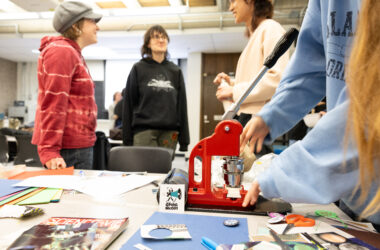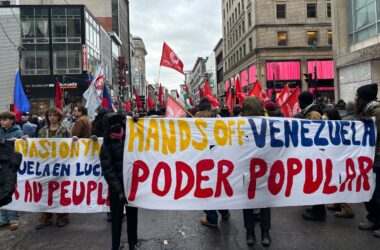Montreal’s rally for International Darfur Day brought attention to the inaction of the international community and common misconceptions about the controversy and violence in the region on Sunday.
Held on the future site of Concordia University’s John Molson School of Business Building, hundreds of Montrealers partook in the rally, pressing for what organizers called “effective [United Nations] intervention” in the war-ravaged region of western Sudan.
“What really strikes us is that the situation in Darfur was going on right around the same time with the anniversary of Rwanda and we were asking ourselves ‘why did we let that happen?'” said Gordon Nelson, U2 Political Science. “Now the same thing is happening in Darfur.”
The rally expressed worries over a possible dramatic escalation of the conflict if the UN does not deploy peacekeepers to Darfur.
“We need to put pressure for the UN to intervene in Sudan,” said rally organizer Tara Tavendar. “Without new peacekeepers, no one would be able to protect the civilians in Darfur.”
The 7,000 African Union peacekeepers that are currently stationed in Darfur are expected to leave the region once their mandate has expired on September 30.
The UN Security Council has assumed the role of peacekeeper and signed a resolution on Aug. 31, 2006, to send a force of 20,000 blue helmets to the region.
The Sudanese government in Khartoum has since refused entry for the international force on grounds that it violates their sovereignty.
The Rally for Darfur is one of several other similar events held in other major cities coinciding with what organizers call Darfur Day.
“The idea is to gather as many people from all kind of backgrounds to tell the people in Darfur that we are in solidarity with them,” said Anne Sainte-Marie of Amnesty International.
Speakers urged action from the Canadian government and people as well.
“As students, we should demand that the Canadian government do something to end the atrocities in Darfur,” said Emily Bennett of McGill Stand Canada.
She went on to remind the crowd that “we already have the capacity here in Canada, we have the ability, what we need is the will to lead.”
Fighting between the Sudanese government’s proxy militia and rebels has continued despite the Darfur Peace Agreement signed between the two parties in May 2006.
Estimates of direct and indirect casualties from the conflict that began in February 2003 ranged from 300,000 to as many as 400,000 people with as many as 2.5 million people internally displaced.
Organizers stress that if Darfur can be left unnoticed as Rwanda was a decade ago, we still lack awareness.
“Sometimes Darfur just disappears from the news and people just forget about the situation there,” said Sainte-Marie. “Once we find out that half a million have died, then we’ll ask why we didn’t know much sooner about the conflict.”
In response to the world-wide demonstrations, Khartoum says that the protesters have misunderstood the situation in Darfur. They argue that the reportage of the conflict has been one sided and is “unfortunately moved by political agendas.”
According to McGill professor Khalid Medani, focusing on the conflict in Darfur as simply genocide can obscure the real problems in the region.
Invited to speak at the Rally for Darfur, Professor Medani told the Tribune that the fighting is part of a wider political and economic problem.
“It’s not to say that it’s less bad. But if you just tell people it’s genocide they will focus less on the government and the comprehensive problem and focus very specifically in trying to call one group victims and them the other groups killers.That’s unfair to the people of Darfur.”
He went on to explain the problems with this conception.
“All Darfurians, both from the Africanized and Arabized tribes, demand the Sudanese government in Khartoum open up the political system, give them more representation and more economic services.”
When violence escalated in February 2003, Khartoum was negotiating a deal with the Southern Sudanese, who demanded greater political autonomy and control over their economic resources, a concession they did not grant to the Darfurians.
“This is why the conflict in Darfur is different from genocide,” said Medani. “The conflict is not one where one community wants to, in whole or in part, exterminate another, but it is a problem where a central government is using a proxy militia to pacify a region for their own interest.”
A report by the Human Rights Watch mentions how the division between “Africans” and “Arabs” in the region has “failed to capture the ethnically diverse society of Darfur and the nuanced relationships among ethnic groups.”
Speaking to the crowd at the rally last Sunday, Medani reminded the audience that the majority of Sudanese are opposed to the regime in Khartoum and that the crisis in Darfur is part of a wider problem of political disenfranchisement and excessive economic centralization.
The effort of finding a solution is made more difficult when countries like Russia and especially China (which holds 75 per cent ownership over the oil in Sudan) threaten to veto any resolutions for direct UN intervention in Darfur.
Medani says that the conflict thus broaches another issue, the absence of democracy in the UN, which hampers its ability to mobilize and act as they should in violent crises such as in Sudan.








